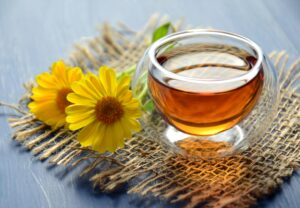
Finding natural remedies to soothe symptoms is a priority when cold and flu season strikes. Herbal teas offer a comforting and effective way to ease discomfort while supporting your body’s immune system. Packed with antioxidants, vitamins, and other healing properties, they can help you recover faster. Here are the top five herbal teas to help fight cold and flu symptoms.
Table of Contents
ToggleGinger Tea: The Warming Healer
Ginger tea is a powerful remedy for cold and flu symptoms. Its anti-inflammatory and antiviral properties help reduce throat soreness, clear nasal congestion, and boost your immunity. Ginger is also known to relieve nausea, which can accompany the flu.

How to Prepare:
- Add a few slices of fresh ginger root to a cup of boiling water.
- Let it steep for 5-10 minutes.
- Add honey and lemon for extra immune-boosting benefits.
Peppermint Tea: The Refreshing Decongestant
Peppermint tea is an excellent choice for relieving nasal congestion and soothing a sore throat. Its menthol content acts as a natural decongestant, helping to open airways and ease breathing. Tea also aids digestion, which can be affected by illness.

How to Prepare:
- Steep a handful of fresh peppermint leaves or a peppermint tea bag in hot water for 5-7 minutes.
- Enjoy as is or with a touch of honey.
Echinacea Tea: The Immune Booster
Echinacea tea is widely recognized for its immune-boosting properties. Drinking this tea at the first sign of a cold can help reduce the severity and duration of symptoms. It’s also known for its ability to reduce inflammation and support overall respiratory health.
How to Prepare:
- Use dried echinacea flowers or a prepackaged tea bag.
- Steep in hot water for 10 minutes.
- Sweeten with honey, which also has antibacterial properties.
Chamomile Tea: The Soothing Comforter

Chamomile tea is your go-to for soothing sore throats and promoting restful sleep during illness. Its anti-inflammatory and antibacterial properties help reduce discomfort, while its calming effects make it easier to relax and recover.

How to Prepare:
- Steep dried chamomile flowers or a chamomile tea bag in hot water for 5 minutes.
- Add a slice of lemon or a dollop of honey for added relief.
Licorice Root Tea: The Natural Soother
Licorice root tea is highly effective in reducing throat pain and coughing. It’s natural sweetness and anti-inflammatory properties help calm irritated respiratory passages. Additionally, licorice root contains compounds that may help fight viruses.
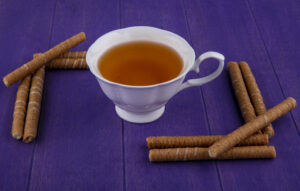
How to Prepare:
- Boil a small piece of dried licorice root in water for 10-15 minutes.
- Strain and enjoy warm.
Bonus Tips for Fighting Cold and Flu with Herbal Teas
- Drink Warm, Not Hot: Sipping warm tea is comforting, but overly hot liquids can irritate your throat.
- Stay Hydrated: Herbal teas help keep you hydrated, an essential factor in recovery.
- Add Boosters: Enhance your teas with natural additives like honey, lemon, or turmeric for extra benefits.

Conclusion:
Herbal teas are a natural and soothing way to combat cold and flu symptoms. Ginger, peppermint, echinacea, chamomile, and licorice root teas each bring unique benefits to help you feel better faster. Incorporate these teas into your daily routine during the cold season to support your immune system and find relief.
So, the next time you’re feeling under the weather, reach for a comforting cup of herbal tea—it’s nature’s medicine in a mug!
Other Herbal teas:
Tisane Tea: The All-Encompassing Herbal Drink
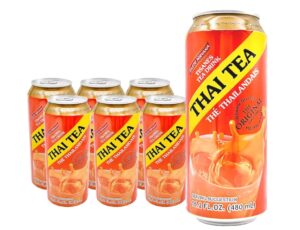
Tisane tea is the umbrella term for all herbal teas that don’t contain traditional tea leaves. These are made by infusing herbs, spices, flowers, and fruits in hot water. Tisane teas are caffeine-free, making them a great choice for relaxation, digestion, and hydration. Popular blends include chamomile, peppermint, and hibiscus.
Pukka Herbal Tea: Blends for Every Mood

Pukka tea is a renowned brand offering organic herbal tea blends designed to support specific needs. From “Feel New” for detoxification to “Three Ginger” for digestive health, these teas combine herbs like turmeric, fennel, and licorice to promote overall well-being. They are sustainably sourced, ensuring both health and environmental benefits.
Chinese Herbal Tea: Centuries of Wisdom in a Cup
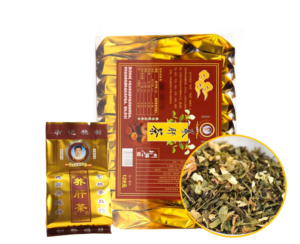
Chinese herbal teas are rooted in traditional Chinese medicine (TCM). These teas often include blends of ginseng, goji berries, jujube, and chrysanthemum, targeting issues like fatigue, stress, and immune deficiencies. They are highly customizable based on individual health needs and are widely revered for their healing properties.
Wellness Tea: Holistic Support for Mind and Body

Wellness teas are crafted to promote a sense of balance and health. They often include adaptogenic herbs like ashwagandha and holy basil, which help the body adapt to stress. Other common ingredients include lemon balm for relaxation and rooibos for antioxidant support.
Boost Immunity Tea: Defend Against Illness

Boost immunity teas combine herbs like echinacea, ginger, turmeric, and elderberry to strengthen your body’s defenses. These teas are ideal during cold and flu seasons or when you feel your energy levels dipping. Regular consumption can help reduce the frequency and severity of illnesses.
South African Herbal Tea: Rich in Antioxidants

South African herbal tea is famous for rooibos, a red herbal tea with a mild, sweet flavor. Rich in antioxidants and minerals, rooibos supports heart health, reduces inflammation, and promotes glowing skin. Honeybush, another South African herbal tea, is equally beneficial and slightly sweeter, making it a soothing option for evenings.
PCOS Herbal Tea: Hormonal Balance Naturally

Women with polycystic ovary syndrome (PCOS) can benefit from herbal teas designed to regulate hormones. Ingredients like spearmint (to lower androgen levels), cinnamon (to improve insulin sensitivity), and chasteberry (to balance menstrual cycles) make these teas a natural support for managing PCOS symptoms.
Herbal Detox Tea: Cleanse and Refresh

Herbal detox teas often include dandelion root, burdock root, and milk thistle to support liver health and eliminate toxins. These teas help improve digestion, boost energy, and promote clear skin. They’re a great way to reset your body after overindulgence or during a cleanse.
Herbal Tea for Fasting: Aiding the Process

When fasting, herbal teas like green tea, hibiscus, and ginger can help curb hunger, boost metabolism, and maintain hydration. Since they are calorie-free, they won’t break your fast, making them an excellent choice for intermittent fasting or detox programs.
Hibiscus Tea for Heart Health:

Hibiscus tea is excellent for heart health, it helps lower blood pressure and cholesterol levels. Its rich antioxidant content supports overall cardiovascular function. Regular consumption may reduce the risk of heart-related issues.
Tips for Maximizing Herbal Tea Benefits
- Experiment with Blends: Combine herbs like ginger and turmeric for enhanced health benefits.
- Use Fresh Ingredients: Whenever possible, opt for fresh or high-quality dried herbs.
- Pair with Healthy Habits: Drink herbal teas as part of a balanced diet and lifestyle.
Conclusion
From traditional Chinese blends to modern wellness teas, herbal teas offer a diverse range of benefits tailored to your health needs. Whether you want to boost immunity, manage PCOS symptoms, detoxify, or simply enjoy a soothing cup during fasting, there’s an herbal tea for you. Explore these options and make herbal teas a cornerstone of your daily wellness routine.
Embrace the healing power of nature, one sip at a time!
Frequently asked Questions:
Which herbal teas are best for relieving cold and flu symptoms?
Ginger tea, chamomile tea, peppermint tea, elderberry tea, and echinacea tea are among the best herbal teas for soothing cold and flu symptoms.
How does ginger tea help with colds?
Ginger tea has anti-inflammatory and antimicrobial properties that ease sore throats, reduce nausea, and improve blood circulation to support the immune system.
Can chamomile tea relieve cold symptoms?
Yes, chamomile tea can reduce inflammation, promote relaxation, and improve sleep, which is essential for recovery from a cold or flu.
Is peppermint tea effective for nasal congestion?
Peppermint tea contains menthol, which helps clear sinuses and alleviate nasal congestion while soothing headaches.
How does elderberry tea boost immunity?
Elderberry tea is rich in antioxidants and antiviral compounds that strengthen the immune system and reduce the duration of colds.
Should echinacea tea be taken daily during flu season?
Echinacea tea can be consumed regularly during flu season to boost immunity, but it’s best to consult a healthcare provider for long-term use.
Are these herbal teas safe for children?
Most herbal teas are safe for children in moderation but avoid strong brews or teas like elderberry and echinacea without consulting a pediatrician.
Can I add honey to these teas for added benefits?
Yes, honey is a natural remedy for sore throats and can enhance the flavor and benefits of herbal teas, especially for colds and flu.
Is it safe to drink herbal teas while on medication for a cold?
Some herbal teas may interact with medications. Consult your doctor if you’re on cold or flu medications.
Which tea is best for preventing colds?
Elderberry and echinacea teas are excellent for boosting immunity and preventing colds when consumed regularly.
Which herbal tea is good for heart health?
Hibiscus tea is excellent for heart health, it helps lower blood pressure and cholesterol while supporting overall cardiovascular function.
You may also check:“Top 10 Healing Foods for Everyday Health”

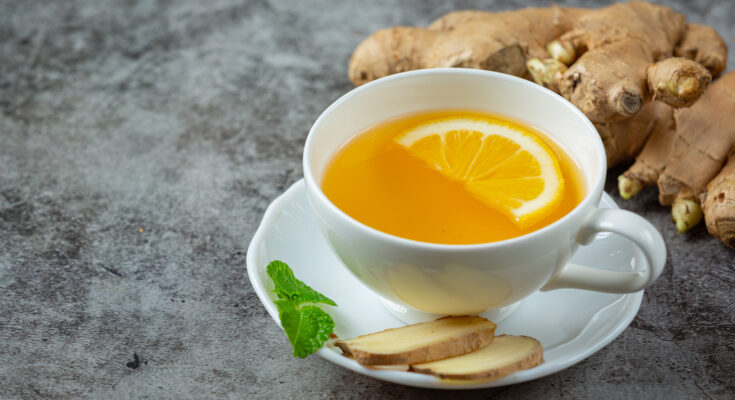


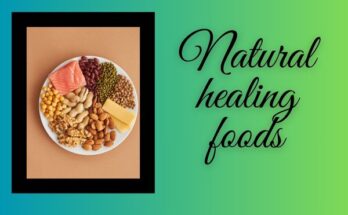
I have to get across my passion for your generosity in support of persons that should have guidance on your theme. Your personal commitment to passing the solution all over was quite advantageous and has all the time enabled associates just like me to attain their dreams. Your interesting useful information indicates so much to me and a whole lot more to my fellow workers. With thanks; from all of us.
Thank you for such a heartfelt message! I’m truly humbled to know that the information has been helpful to you and others. Your kind words inspire me to continue sharing and supporting those seeking guidance. Wishing you and your associates continued success in achieving your goals!
This blogpost answered a lot of questions I had. The examples provided make it easy to understand. This post is really informative and provides great insights! Great read! Looking forward to more posts like this. I appreciate the detailed information shared here.
Thank you for such a thoughtful comment! I’m thrilled you found the post helpful and informative—more content like this is on the way!
A person essentially help to make seriously articles I would state. This is the first time I frequented your website page and thus far? I surprised with the research you made to make this particular publish incredible. Wonderful job!
Thank you so much for your kind words! I truly appreciate your feedback and am thrilled that you found the article valuable. Your encouragement motivates me to continue creating quality content. Thanks for visiting, and I hope you’ll return for more insightful reads! 😊
Thank you so much for your thoughtful feedback! I’m thrilled you enjoyed the article and appreciate your kind words. Hope to see you around more often! 😊